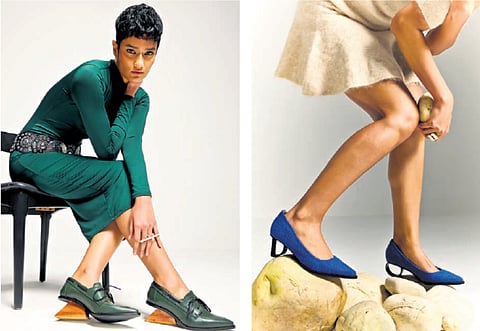A Well Heeled Way to Go
Her fascination for Dutch clogs has led Chennai-based designer Anita Soundar to shape shoes in wood and alternate materials. After working on over 150 designs over the past three years, she has now launched her shoe wear brand—Disobedience—with 40 distinctive gender-neutral styles spanning sizes 35 to 45.
“For me, Disobedience is a short self-talk reassuring myself that it is fine to accept myself for who I am and desist from apologising. We are constantly told how we are supposed to live our life. In the process we forget to find who we truly are. Disobedience is an endorsement of your unique, incomparable self,” says Soundar. This is another reason why she refrains from launching collections, as each design is extraordinary unto itself.
A chemical engineer by education, and a designer by passion, Soundar completed her masters in environmental management. Her love for these different disciplines comes together in the curation of the materials she makes use of in her creations.
“I have come up with fabricated heels using steel—to ensure a recyclable nature—and even offer a buy back option to clients and recycle at our end,” shares Soundar, having majored in leather goods design in Milan after graduating from National Institute of Fashion Technology in Chennai. Then sharpening her finesse and acumen at the renowned Cercal—Research Centre and International Footwear School in San Mauro Pascoli in Italy.
The highest heel measures 65mm—“I’m not a big fan of high heels,” she says—with Soundar going about designing an ergonomic feat similar to the famous YSL heels. The 42-year-old started the company in 2020 and deep-dived into research and development to shape her own concepts, taking four years to set up the manufacturing facility.
“Ours is a concise team as we have been doing product development for three years, since we were unable to afford salaries for external designers. This led us to learn the skill to do the job,” she says.
Her buyers include experimental shoe shoppers and “early adopters who want to wear shoes that are different from the template-driven formats readily available in the market,” she adds. Elements of playful geometry run through her creations, with the love for wooden heels stemming from the traditional clogs worn in Holland.
“Our in-depth research revealed that the clogs were made using wooden heels and silk materials, and it was only post the end of the Industrial Revolution in 1840 that the use of these materials was streamlined,” she says.
It is a generous run of natural fibres in the plethora of materials she brings into the making of the shoes. From organic kala cotton grown in Kutch, to handwoven cotton and wool; hemp, jute, linen, banana crop, sugarcane bagasse and tomato scrap waste-based plant leather alternatives—it is a curious mix that finds its way into the manufacturing of the designs, justifying the price range pegged at Rs 15,000-30,000.
“We also work with upcycled plastic textiles made from secondary plastic waste which otherwise would have ended in landfill, as well as 100 per cent cellulose,” she says. What’s next? “Following the footsteps of established brands in the business, including Stella Mc Cartney, Patagonia and TOMS,” she shoots back. Stride on.

